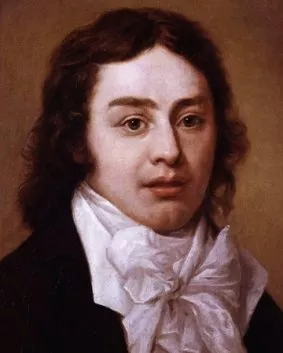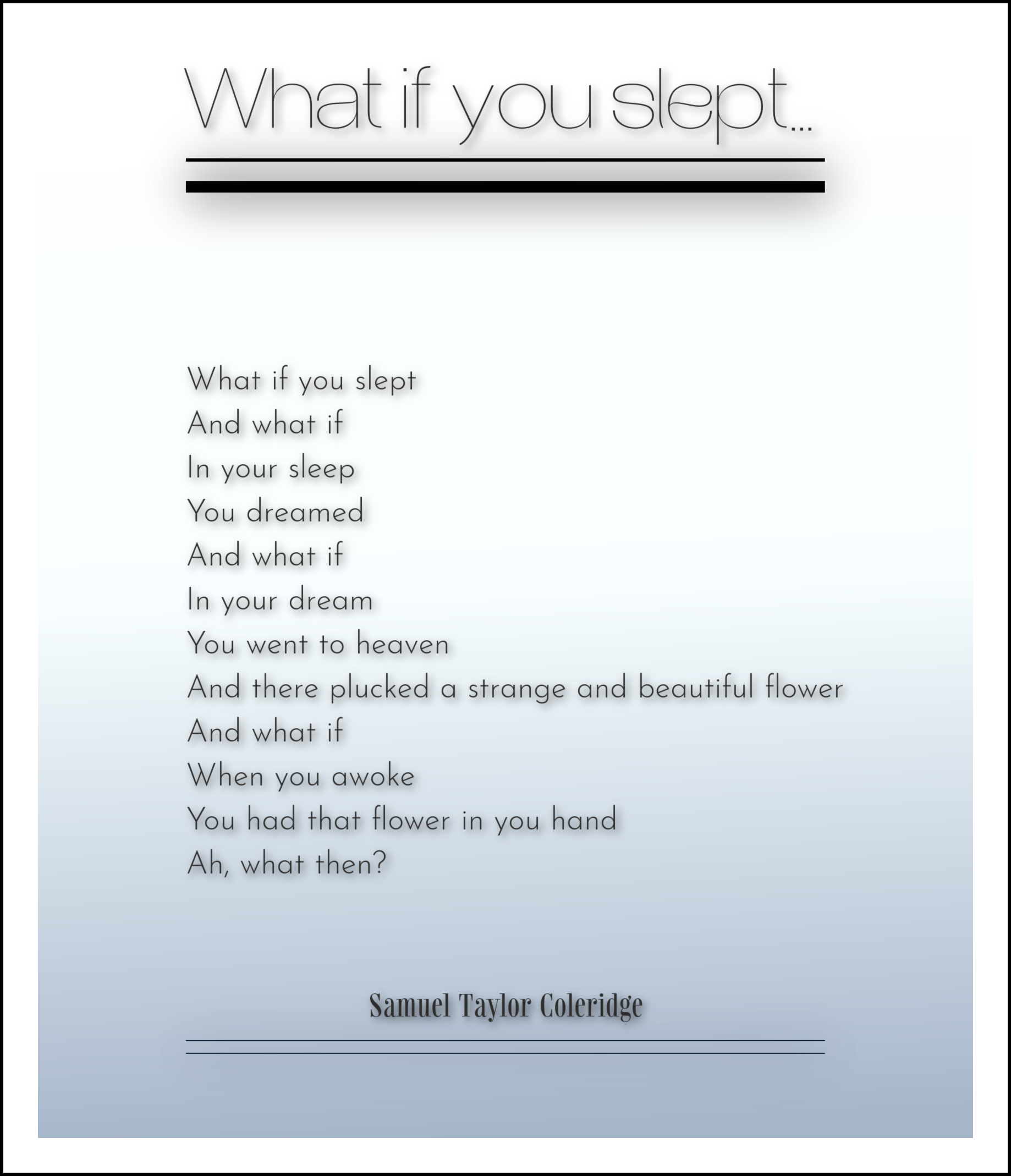
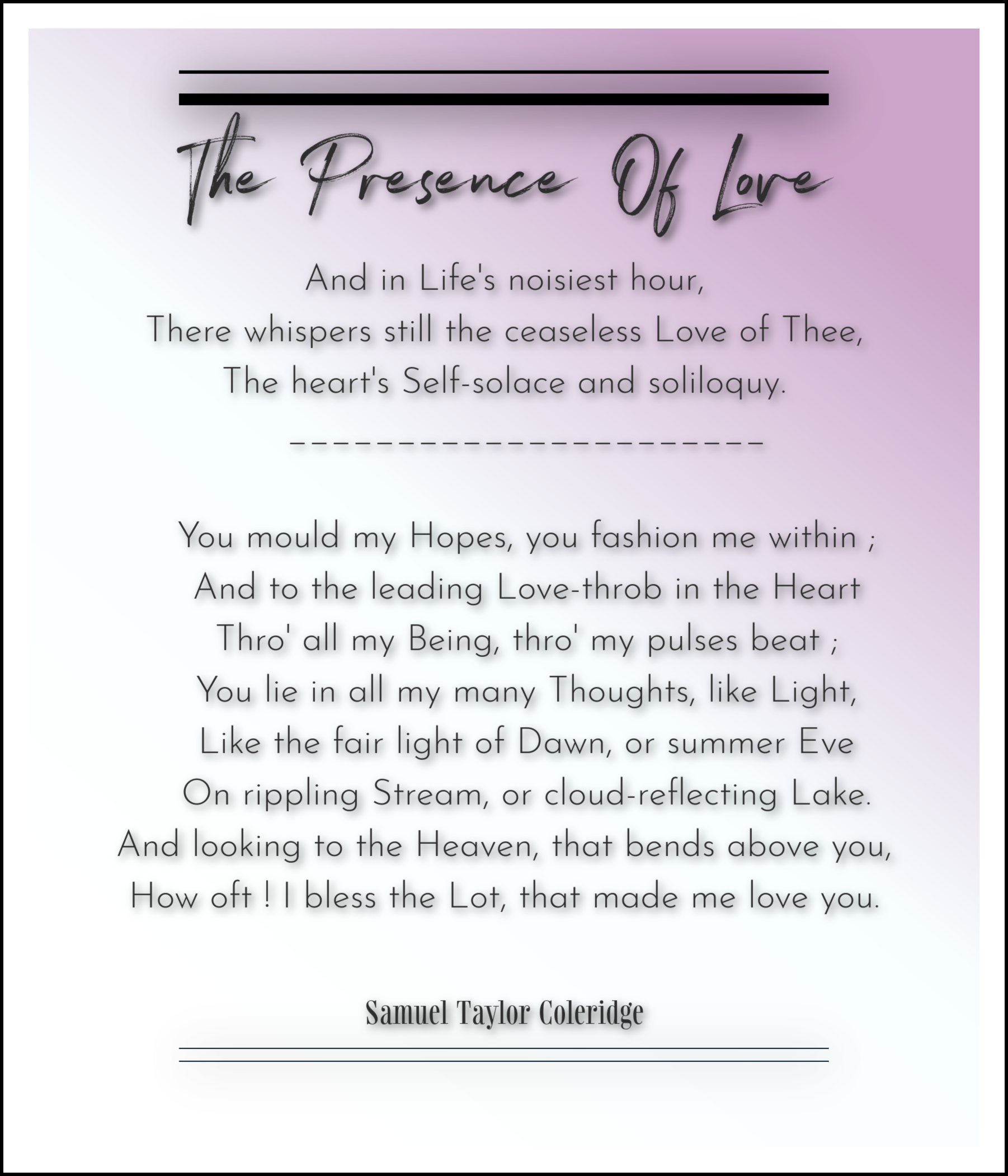
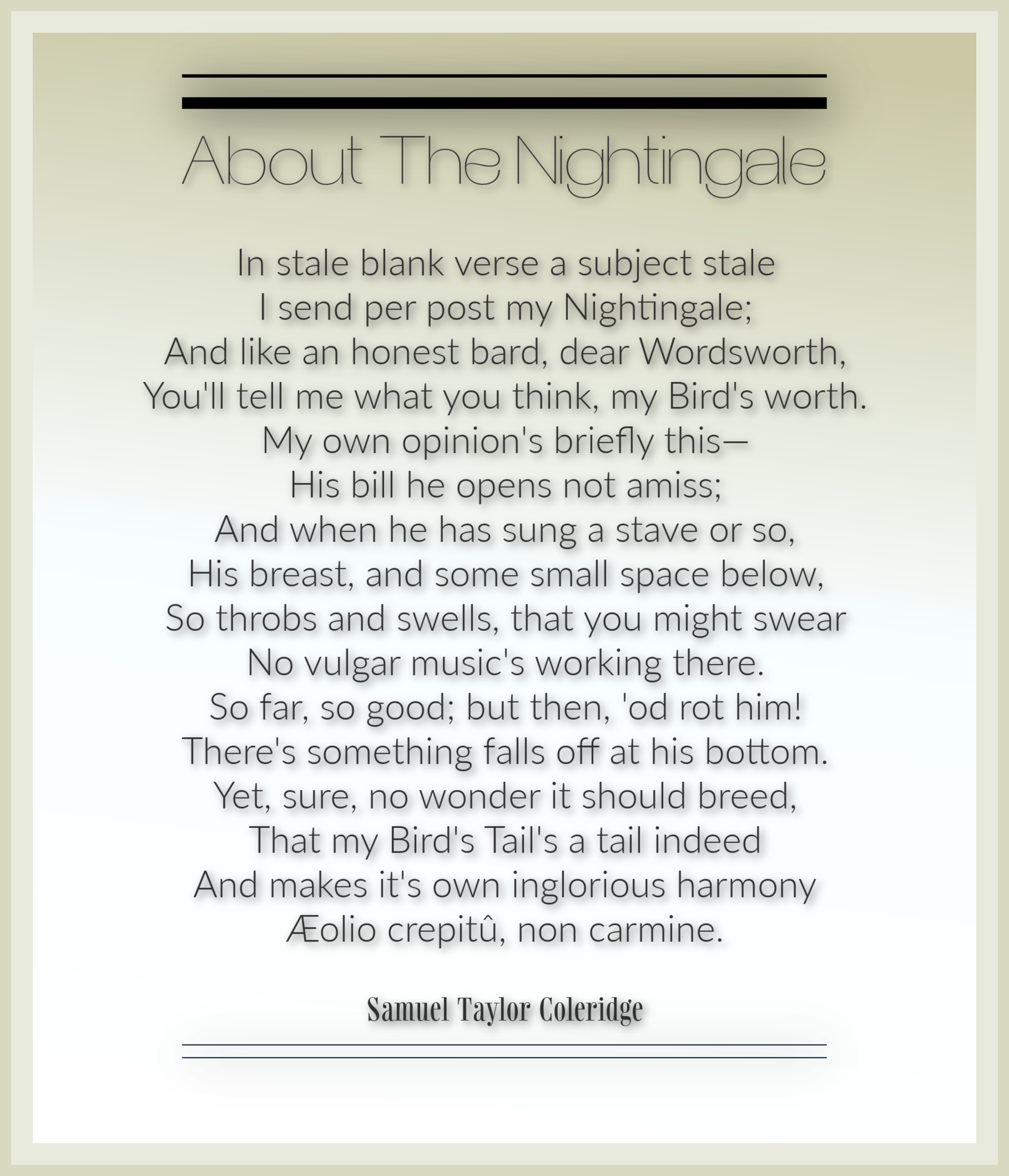
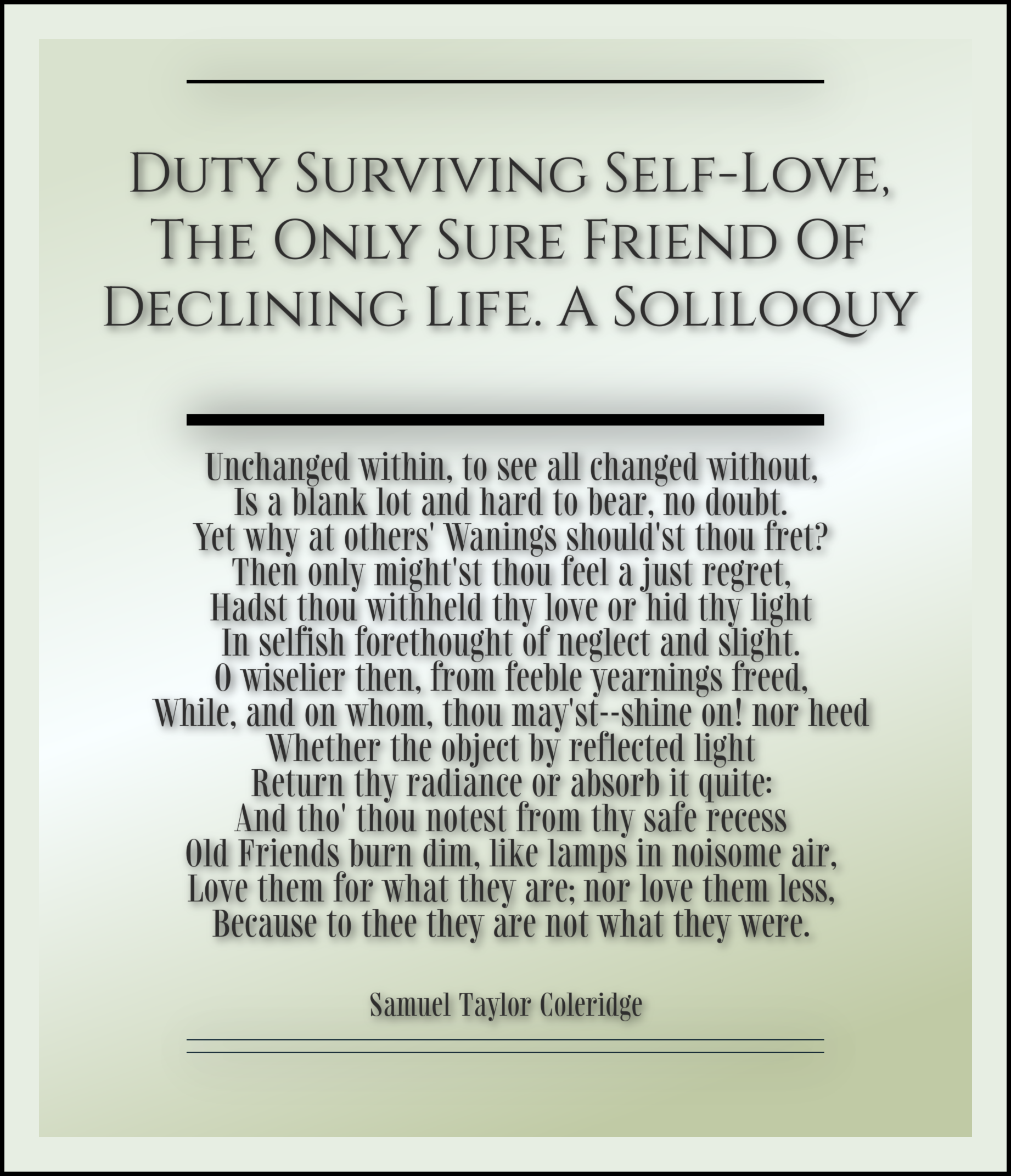
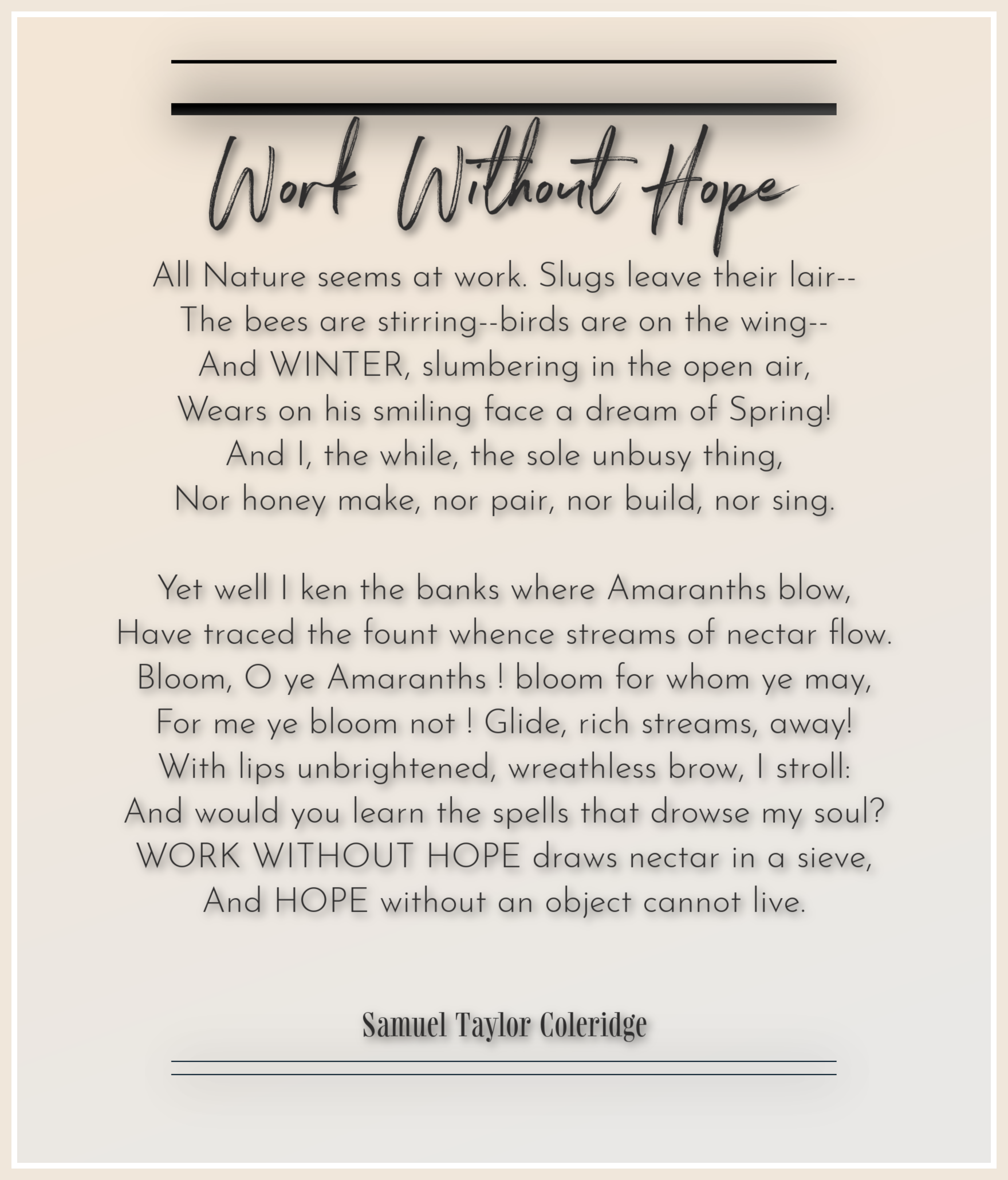
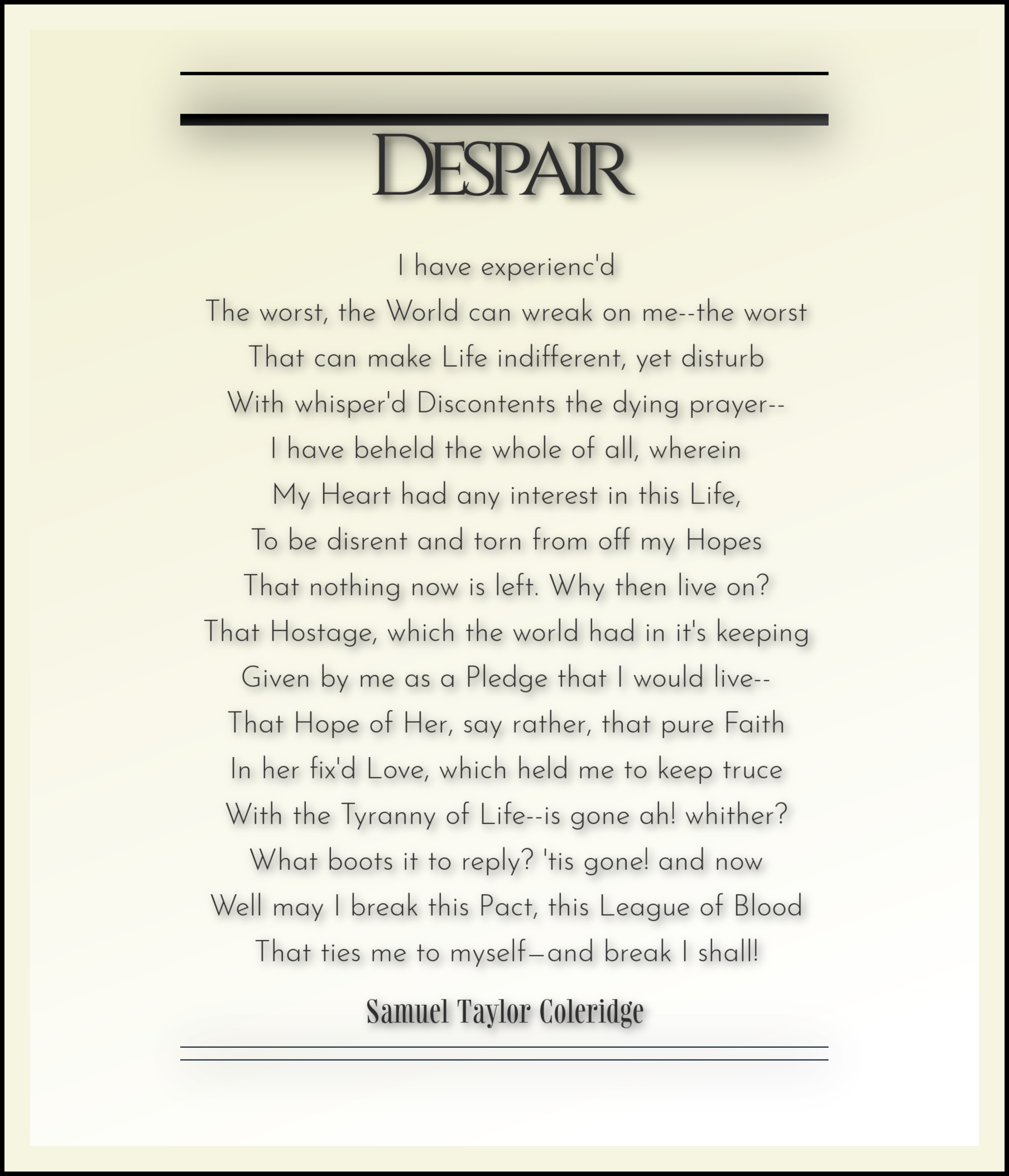
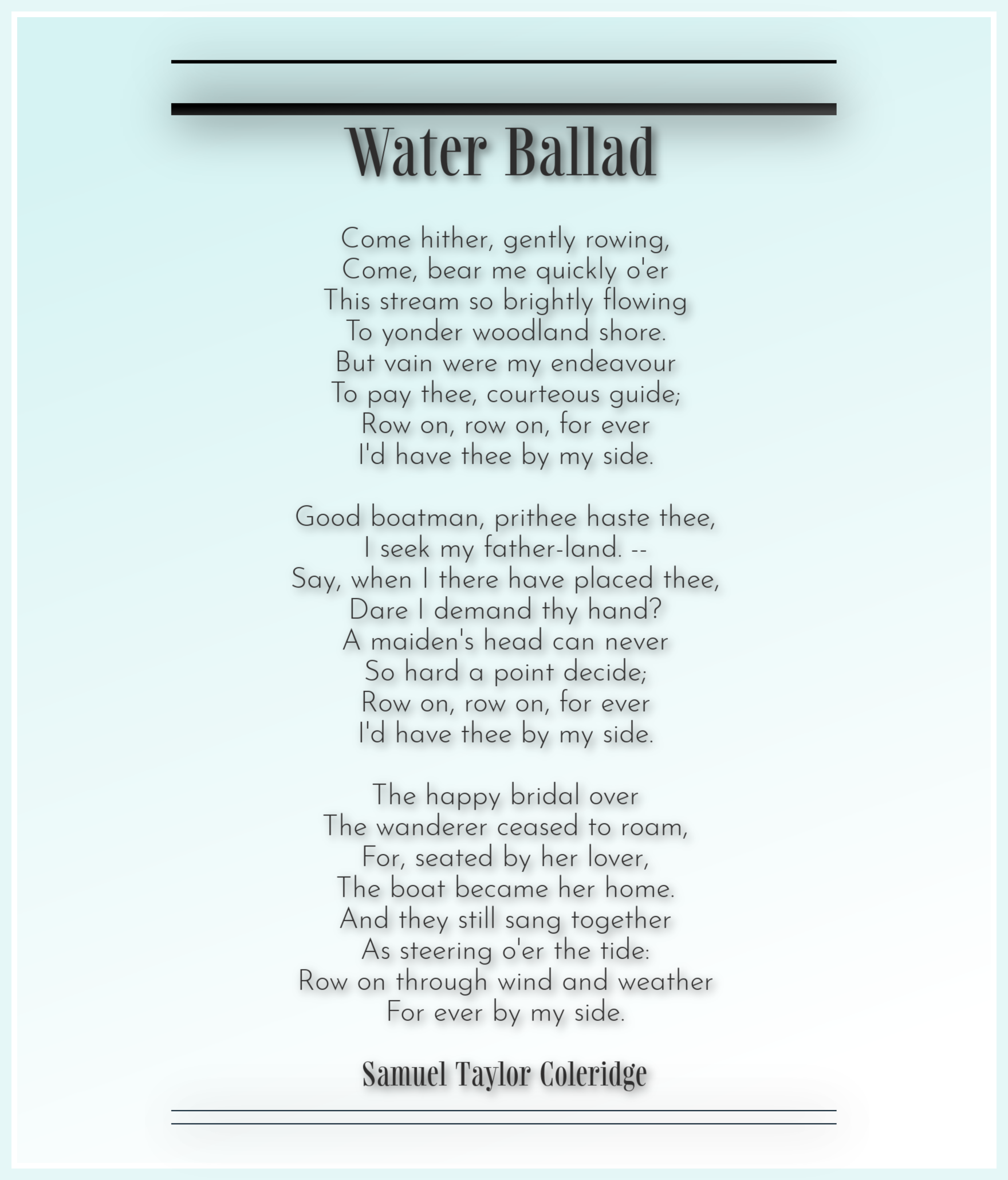
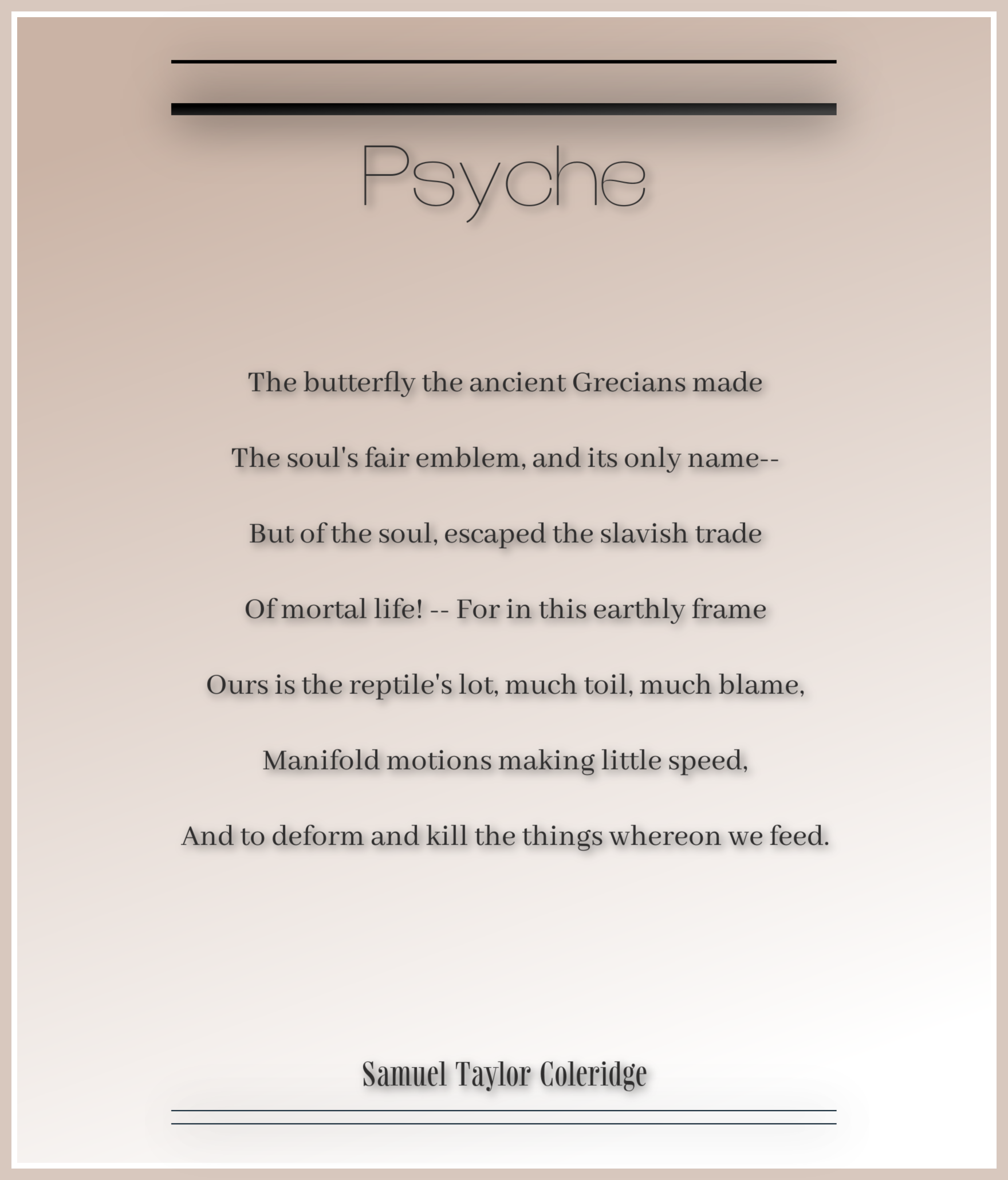
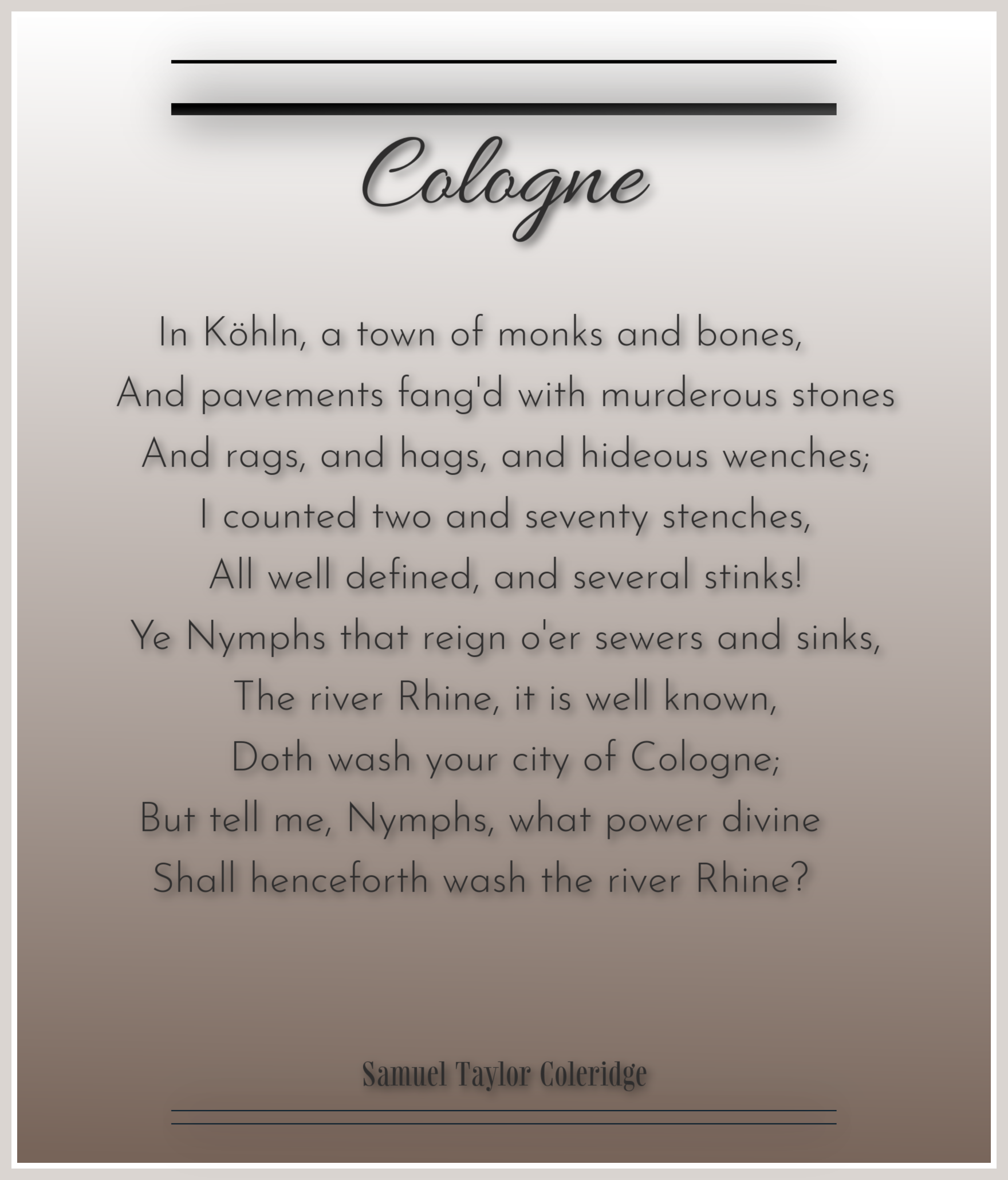
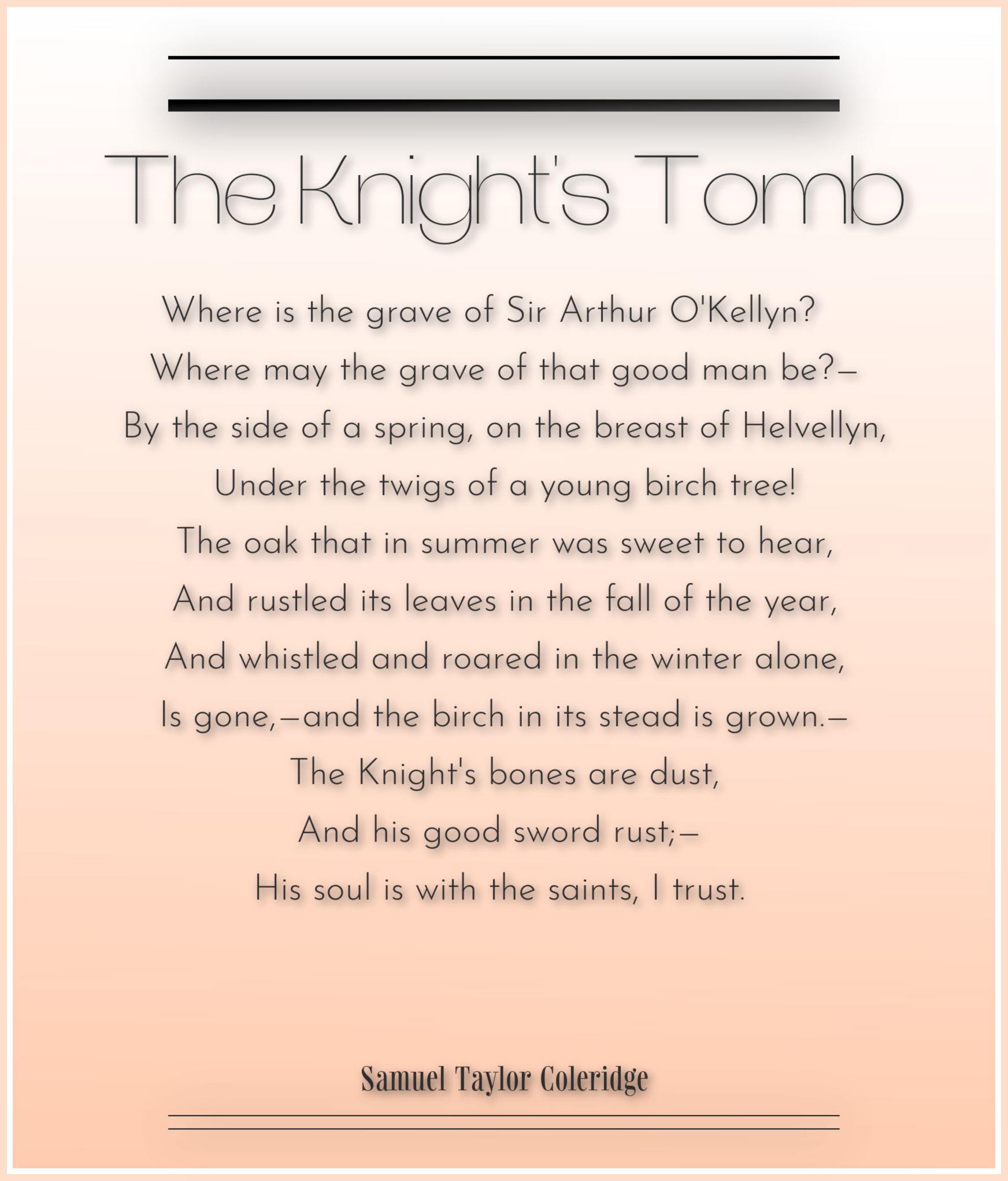
Youth And Age
Verse, a Breeze 'mid blossoms straying,
Where HOPE clung feeding, like a bee--
Both were mine ! Life went a-maying
With NATURE, HOPE, and POESY,
I was young!
When I was young? -- Ah, woeful WHEN!
Ah ! for the Change 'twixt Now and Then!
This breathing House not built with hands,
This body that does me grievous wrong,
O'er æry Cliffs and glittering Sands,
How lightly then it flashed along:--
Like those trim skiffs, unknown of yore,
On winding lakes and rivers wide,
That ask no aid of Sail or Oar,
That fear no spite of Wind or Tide!
Nought cared this Body for wind or weather
When YOUTH and I lived in't together.
FLOWERS are lovely; LOVE is flower-like;
FRIENDSHIP is a sheltering tree;
O! the Joys, that came down shower-like,
Of FRIENDSHIP, LOVE, and LIBERTY,
Ere I was old!
Ere I was old? -- Ah woeful ERE,
Which tells me, YOUTH'S no longer here!
O YOUTH! for years so many and sweet,
'Tis known, that Thou and I were one,
I'll think it but a fond conceit--
It cannot be that Thou art gone!
Thy Vesper-bell hath not yet toll'd:--
And thou wert aye a Masker bold!
What strange Disguise hast now put on,
To make believe, that thou art gone?
I see these Locks in silvery slips,
This drooping Gait, this altered Size:
But SPRINGTIDE blossoms on thy Lips,
And Tears take sunshine from thine eyes!
Life is but Thought: so think I will
That YOUTH and I are House-mates still.
Dew-drops are the gems of morning,
But the tears of mournful eve!
Where no hope is, life's a warning
That only serves to make us grieve,
When we are old:
That only serves to make us grieve
With oft and tedious taking-leave,
Like some poor nigh-related guest,
That may not rudely be dismist;
Yet hath outstay'd his welcome while,
And tells the jest without the smile.
Frost At Midnight
The Frost performs its secret ministry,
Unhelped by any wind. The owlet's cry
Came loud--and hark, again! loud as before.
The inmates of my cottage, all at rest,
Have left me to that solitude, which suits
Abstruser musings: save that at my side
My cradled infant slumbers peacefully.
'Tis calm indeed! so calm, that it disturbs
And vexes meditation with its strange
And extreme silentness. Sea, hill, and wood,
This populous village! Sea, and hill, and wood,
With all the numberless goings-on of life,
Inaudible as dreams! the thin blue flame
Lies on my low-burnt fire, and quivers not;
Only that film, which fluttered on the grate,
Still flutters there, the sole unquiet thing.
Methinks, its motion in this hush of nature
Gives it dim sympathies with me who live,
Making it a companionable form,
Whose puny flaps and freaks the idling Spirit
By its own moods interprets, every where
Echo or mirror seeking of itself,
And makes a toy of Thought.
But O! how oft,
How oft, at school, with most believing mind,
Presageful, have I gazed upon the bars,
To watch that fluttering stranger! and as oft
With unclosed lids, already had I dreamt
Of my sweet birth-place, and the old church-tower,
Whose bells, the poor man's only music, rang
From morn to evening, all the hot Fair-day,
So sweetly, that they stirred and haunted me
With a wild pleasure, falling on mine ear
Most like articulate sounds of things to come!
So gazed I, till the soothing things, I dreamt,
Lulled me to sleep, and sleep prolonged my dreams!
And so I brooded all the following morn,
Awed by the stern preceptor's face, mine eye
Fixed with mock study on my swimming book:
Save if the door half opened, and I snatched
A hasty glance, and still my heart leaped up,
For still I hoped to see the stranger's face,
Townsman, or aunt, or sister more beloved,
My play-mate when we both were clothed alike!
Dear Babe, that sleepest cradled by my side,
Whose gentle breathings, heard in this deep calm,
Fill up the intersperséd vacancies
And momentary pauses of the thought!
My babe so beautiful! it thrills my heart
With tender gladness, thus to look at thee,
And think that thou shalt learn far other lore,
And in far other scenes! For I was reared
In the great city, pent 'mid cloisters dim,
And saw nought lovely but the sky and stars.
But thou, my babe! shalt wander like a breeze
By lakes and sandy shores, beneath the crags
Of ancient mountain, and beneath the clouds,
Which image in their bulk both lakes and shores
And mountain crags: so shalt thou see and hear
The lovely shapes and sounds intelligible
Of that eternal language, which thy God
Utters, who from eternity doth teach
Himself in all, and all things in himself.
Great universal Teacher! he shall mould
Thy spirit, and by giving make it ask.
Therefore all seasons shall be sweet to thee,
Whether the summer clothe the general earth
With greenness, or the redbreast sit and sing
Betwixt the tufts of snow on the bare branch
Of mossy apple-tree, while the nigh thatch
Smokes in the sun-thaw; whether the eave-drops fall
Heard only in the trances of the blast,
Or if the secret ministry of frost
Shall hang them up in silent icicles,
Quietly shining to the quiet Moon.
The Pains Of Sleep
Ere on my bed my limbs I lay,
It hath not been my use to pray
With moving lips or bended knees;
But silently, by slow degrees,
My spirit I to Love compose,
In humble trust mine eye-lids close,
With reverential resignation,
No wish conceived, no thought exprest,
Only a sense of supplication;
A sense o'er all my soul imprest
That I am weak, yet not unblest,
Since in me, round me, every where
Eternal Strength and Wisdom are.
But yester-night I prayed aloud
In anguish and in agony,
Up-starting from the fiendish crowd
Of shapes and thoughts that tortured me:
A lurid light, a trampling throng,
Sense of intolerable wrong,
And whom I scorned, those only strong!
Thirst of revenge, the powerless will
Still baffled, and yet burning still!
Desire with loathing strangely mixed
On wild or hateful objects fixed.
Fantastic passions ! maddening brawl!
And shame and terror over all!
Deeds to be hid which were not hid,
Which all confused I could not know
Whether I suffered, or I did:
For all seemed guilt, remorse or woe,
My own or others still the same
Life-stifling fear, soul-stifling shame.
So two nights passed: the night's dismay
Saddened and stunned the coming day.
Sleep, the wide blessing, seemed to me
Distemper's worst calamity.
The third night, when my own loud scream
Had waked me from the fiendish dream,
O'ercome with sufferings strange and wild,
I wept as I had been a child;
And having thus by tears subdued
My anguish to a milder mood,
Such punishments, I said, were due
To natures deepliest stained with sin,—
For aye entempesting anew
The unfathomable hell within,
The horror of their deeds to view,
To know and loathe, yet wish and do!
Such griefs with such men well agree,
But wherefore, wherefore fall on me?
To be beloved is all I need,
And whom I love, I love indeed.
A Day Dream
My eyes make pictures when they're shut:--
I see a fountain large and fair,
A Willow and a ruined Hut,
And thee, and me, and Mary there.
O Mary! make thy gentle lap our pillow!
Bend o'er us, like a bower, my beautiful green Willow!
A wild-rose roofs the ruined shed,
And that and summer well agree
And lo! where Mary leans her head,
Two dear names carved upon the tree!
And Mary's tears, they are not tears of sorrow:
Our sister and our friend will both be here to-morrow.
'Twas Day! But now few, large, and bright
The stars are round the crescent moon!
And now it is a dark warm Night,
The balmiest of the month of June!
A glow-worm fallen, and on the marge remounting
Shines, and its shadow shines, fit stars for our sweet fountain.
O ever -- ever be thou blest!
For dearly, Asra! love I thee!
This brooding warmth across my breast,
This depth of tranquil bliss -- ah me!
Fount, Tree, and Shed are gone, I know not whither,
But in one quiet room we three are still together.
The shadows dance upon the wall,
By the still dancing fire-flames made;
And now they slumber, moveless all!
And now they melt to one deep shade!
But not from me shall this mild darkness steal thee:
I dream thee with mine eyes, and at my heart I feel thee!
Thine eyelash on my cheek doth play--
'Tis Mary's hand upon my brow!
But let me check this tender lay,
Which none may hear but she and thou!
Like the still hive at quiet midnight humming,
Murmur it to yourselves, ye two beloved women!
Love
All thoughts, all passions, all delights,
Whatever stirs this mortal frame,
All are but ministers of Love,
And feed his sacred flame.
Oft in my waking dreams do I
Live o'er again that happy hour,
When midway on the mount I lay,
Beside the ruined tower.
The moonshine, stealing o'er the scene
Had blended with the lights of eve ;
And she was there, my hope, my joy,
My own dear Genevieve !
She leant against the arméd man,
The statue of the arméd knight ;
She stood and listened to my lay,
Amid the lingering light.
Few sorrows hath she of her own,
My hope ! my joy ! my Genevieve !
She loves me best, whene'er I sing
The songs that make her grieve.
I played a soft and doleful air,
I sang an old and moving story—
An old rude song, that suited well
That ruin wild and hoary.
She listened with a flitting blush,
With downcast eyes and modest grace ;
For well she know, I could not choose
But gaze upon her face.
I told her of the Knight that wore
Upon his shield a burning brand ;
And that for ten long years he wooed
The Lady of the Land.
I told her how he pined : and ah !
The deep, the low, the pleading tone
With which I sang another's love,
Interpreted my own.
She listened with a flitting blush,
With downcast eyes, and modest grace ;
And she forgave me, that I gazed
Too fondly on her face !
But when I told the cruel scorn
That crazed that bold and lovely Knight,
And that he crossed the mountain-woods,
Nor rested day nor night ;
That sometimes from the savage den,
And sometimes from the darksome shade,
And sometimes starting up at once
In green and sunny glade,—
There came and looked him in the face
An angel beautiful and bright ;
And that he knew it was a Fiend,
This miserable Knight !
And that unknowing what he did,
He leaped amid a murderous band,
And saved from outrage worse than death
The Lady of the Land !
And how she wept, and clasped his knees ;
And how she tended him in vain—
And ever strove to expiate
The scorn that crazed his brain ;—
And that she nursed him in a cave ;
And how his madness went away,
When on the yellow forest-leaves
A dying man he lay ;—
His dying words—but when I reached
That tenderest strain of all the ditty,
My faultering voice and pausing harp
Disturbed her soul with pity !
All impulses of soul and sense
Had thrilled my guileless Genevieve ;
The music and the doleful tale,
The rich and balmy eve ;
And hopes, and fears that kindle hope,
An undistinguishable throng,
And gentle wishes long subdued,
Subdued and cherished long !
She wept with pity and delight,
She blushed with love, and virgin-shame ;
And like the murmur of a dream,
I heard her breathe my name.
Her bosom heaved—she stepped aside,
As conscious of my look she stepped—
The suddenly, with timorous eye
She fled to me and wept.
She half enclosed me with her arms,
She pressed me with a meek embrace ;
And bending back her head, looked up,
And gazed upon my face.
'Twas partly love, and partly fear,
And partly 'twas a bashful art,
That I might rather feel, than see,
The swelling of her heart.
I calmed her fears, and she was calm,
And told her love with virgin pride ;
And so I won my Genevieve,
My bright and beauteous Bride.
To A Primrose
The first seen in the season
Nitens et roboris expers
Turget et insolida est: et spe delectat.
- Ovid, Metam. [xv.203].
Thy smiles I note, sweet early Flower,
That peeping from thy rustic bower
The festive news to earth dost bring,
A fragrant messenger of Spring.
But, tender blossom, why so pale?
Dost hear stern Winter in the gale?
And didst thou tempt the ungentle sky
To catch one vernal glance and die?
Such the wan lustre Sickness wears
When Health's first feeble beam appears;
So languid are the smiles that seek
To settle on the care-worn cheek,
When timorous Hope the head uprears,
Still drooping and still moist with tears,
If, through dispersing grief, be seen
Of Bliss the heavenly spark serene.
And sweeter far the early blow,
Fast following after storms of Woe,
Than (Comfort's riper season come)
Are full-blown joys and Pleasure's gaudy bloom.
To An Infant
Ah cease thy tears and sobs, my little life!
I did but snatch away the unclasped knife:
Some safer toy will soon arrest thine eye,
And to quick laughter change this peevish cry!
Poor stumbler on the rocky coast of woe,
Tutored by pain each source of pain to know!
Alike the foodful fruit and scorching fire
Awake thy eager grasp and young desire:
Alike the good, the ill offend thy sight,
And rouse the stormy sense of shrill affright!
Untaught, yet wise! mid all thy brief alarms
Thou closely clingest to thy mother's arms,
Nestling thy little face in that fond breast
Whose anxious heavings lull thee to thy rest!
Man's breathing miniature! thou mak'st me sigh--
A babe art thou -- and such a thing am I!
To anger rapid and as soon appeased,
For trifles mourning and by trifles pleased;
Break friendship's mirror with a tetchy blow,
Yet snatch what coals of fire on pleasure's altar glow!
Oh thou that rearest with celestial aim
The future seraph in my mortal frame,
Thrice holy Faith! whatever thorns I meet
As on I totter with unpractised feet,
Still let me stretch my arms and cling to thee,
Meek nurse of souls through their long infancy!
Limbo
The sole true Something--This ! In Limbo Den
It frightens Ghosts as Ghosts here frighten men--
For skimming in the wake it mock'd the care
Of the old Boat-God for his Farthing Fare;
Tho' Irus' Ghost itself he ne'er frown'd blacker on,
The skin and skin-pent Druggist crost the Acheron,
Styx, and with Puriphlegethon Cocytus,--
(The very names, methinks, might thither fright us--)
Unchang'd it cross'd—& shall some fated Hour
Be pulveris'd by Demogorgon's power
And given as poison to annilate Souls--
Even now It shrinks them ! they shrink in as Moles
(Nature's mute Monks, live Mandrakes of the ground)
Creep back from Light--then listen for its Sound;--
See but to dread, and dread they know not why--
The natural Alien of their negative Eye.
'Tis a strange place, this Limbo!--not a Place,
Yet name it so;--where Time & weary Space
Fettered from flight, with night-mair sense of fleeing,
Strive for their last crepuscular half-being;--
Lank Space, and scytheless Time with branny hands
Barren and soundless as the measuring sands,
Not mark'd by flit of Shades,--unmeaning they
As Moonlight on the dial of the day!
But that is lovely—looks like Human Time,--
An Old Man with a steady Look sublime,
That stops his earthly Task to watch the skies;
But he is blind--a Statue hath such Eyes;--
Yet having moon-ward turn'd his face by chance,
Gazes the orb with moon-like countenance,
With scant white hairs, with foretop bald & high,
He gazes still,--his eyeless Face all Eye;
As 'twere an organ full of silent Sight,
His whole Face seemeth to rejoice in Light!
Lip touching lip, all moveless, bust and limb,
He seems to gaze at that which seems to gaze on him!
No such sweet sights doth Limbo Den immure,
Wall'd round, and made a Spirit-jail secure,
By the mere Horror of blank Naught-at-all,
Whose circumambience doth these Ghosts enthral.
A lurid thought is growthless, dull Privation,
Yet that is but a Purgatory curse;
Hell knows a fear far worse,
A fear—a future fate.--'Tis positive Negation!
Human Life, On The Denial Of Immortality
If dead, we cease to be; if total gloom
Swallow up life's brief flash for aye, we fare
As summer-gusts, of sudden birth and doom,
Whose sound and motion not alone declare,
But are their whole of being! If the breath
Be Life itself, and not its task and tent,
If even a soul like Milton's can know death;
O Man! thou vessel purposeless, unmeant,
Yet drone-hive strange of phantom purposes!
Surplus of Nature's dread activity,
Which, as she gazed on some nigh-finished vase,
Retreating slow, with meditative pause,
She formed with restless hands unconsciously.
Blank accident! nothing's anomaly!
If rootless thus, thus substanceless thy state,
Go, weigh thy dreams, and be thy hopes, thy fears,
The counter-weights! Thy laughter and thy tears
Mean but themselves, each fittest to create
And to repay the other! Why rejoices
Thy heart with hollow joy for hollow good?
Why cowl thy face beneath the mourner's hood?
Why waste thy sighs, and thy lamenting voices,
Image of Image, Ghost of Ghostly Elf,
That such a thing as thou feel'st warm or cold?
Yet what and whence thy gain, if thou withhold
These costless shadows of thy shadowy self?
Be sad! be glad! be neither! seek, or shun!
Thou hast no reason why! Thou canst have none;
Thy being's being is contradiction.
On Donne's Poetry
With Donne, whose muse on dromedary trots,
Wreathe iron pokers into true-love knots;
Rhyme's sturdy cripple, fancy's maze and clue,
Wit's forge and fire-blast, meaning's press and screw.
What Is Life?
Resembles Life what once was held of Light,
Too ample in itself for human sight?
An absolute Self--an element ungrounded--
All, that we see, all colours of all shade
By encroach of darkness made?--
Is very life by consciousness unbounded?
And all the thoughts, pains, joys of mortal breath,
A war-embrace of wrestling Life and Death?
Aplolgia Pro Vita Sua
The poet in his lone yet genial hour
Gives to his eyes a magnifying power :
Or rather he emancipates his eyes
From the black shapeless accidents of size—
In unctuous cones of kindling coal,
Or smoke upwreathing from the pipe's trim bole,
His gifted ken can see
Phantoms of sublimity.
Phantom
All look and likeness caught from earth
All accident of kin and birth,
Had pass'd away. There was no trace
Of aught on that illumined face,
Uprais'd beneath the rifted stone
But of one spirit all her own;--
She, she herself, and only she,
Shone through her body visibly.
|
|
